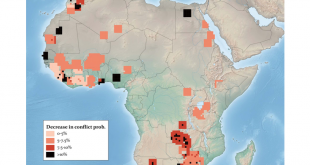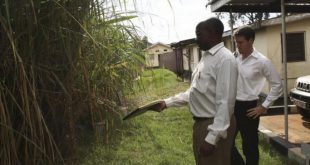Read More »
IPA’s weekly links
Guest post by Jeff Mosenkis of Innovations for Poverty Action. The summer ape blockbuster you’re been waiting for is here. In Science economists Seema Jayachandran, and Joost de Laat team up with satellite researchers Eric Lambin, Charlotte Stanton, Robin Audy, and Nancy Thomas (with some help from IPA and Uganda’s Chimpanzee Sanctuary and Wildlife Conservation Trust). They ran the first RCT showing that just paying farmers in Uganda a little bit not to cut down forest on their land where...
Read More »IPA’s weekly links
Guest post by Jeff Mosenkis of Innovations for Poverty Action. North Korea’s surprising, lucrative relationship with Africa (via Kim Yi Dionne) In an inexplicable lapse some congressional staffer has surely been punished for, the House Foreign Affairs Committee invited three eminently qualified women to testify about women’s empowerment in the developing world. Even more encouraging was that the hearing was titled “Beyond Microfinance.” Mary Ellen Iskenderian, head of the financial...
Read More »IPA’s weekly links
Guest post by Jeff Mosenkis of Innovations for Poverty Action. Above: Maintaining attention for a long interview is always a challenge Fake news is already disrupting Kenya’s election. Qualtrics, the research software company, did a randomized experiment testing the kinds of extra questions researchers embed in surveys to make sure respondents are paying attention and answering thoughtfully. They found including those questions earlier in a survey actually led to respondents performing...
Read More »IPA’s weekly links
Guest post by Jeff Mosenkis of Innovations for Poverty Action. We don’t do enough thinking in the U.S., much less in developing countries, about end of life “palliative” care, helping people with difficult terminal illnesses suffer less. But a lot of suffering happens at the end of life; if your goal is to alleviate suffering, pain management is doable. The BBC has a very interesting story of the woman who singlehandedly brought palliative care to Mongolia. David Evans summarizes a post and...
Read More »IPA’s weekly links
Guest post by Jeff Mosenkis of Innovations for Poverty Action. Three relatively recent additions to development Twitter worth noticing if you haven’t already, Tavneet Suri, Nava Ashraf, Seema Jayachandran. Here’s proof from just this week: There’s a new website devoted to making development research easily accessible, VoxDev.org. Editor Tavneet Suri says: Here is our vision: We want to bring cutting-edge research to the forefront of decision making – for policymakers, the private sector,...
Read More »IPA’s weekly links
Guest post by Jeff Mosenkis of Innovations for Poverty Action. It’s a puzzle why more people don’t use long-acting reversible contraceptives like IUDs or hormone shots. Berk Ozler reports on qualitative findings from Cameroon about why adolescent girls don’t seem interested in them. A new working paper suggests that how refugees fare economically in the U.S. is heavily dependent on at what age they arrive, perhaps because learning English is easier if they come earlier. The authors estimate...
Read More »IPA’s weekly links
Guest post by Jeff Mosenkis of Innovations for Poverty Action. I know this week for many of us it’s been hard to pay attention to what else has been going on in the world, what with the release of Stata 15 and all, but I’ll try to help with some stuff you may have missed: The World Bank’s Hedy Sladovich &Emanuela Galasso put together several very accessibly written one-paragraph summaries of recent findings on what works in early childhood development. It pairs nicely with this (mostly...
Read More »IPA’s weekly links
Guest post by Jeff Mosenkis of Innovations for Poverty Action. “Why Poverty is Like a Disease” looks at epigenetics and how poverty interacts with one’s own biological development. It’s well written, by someone who describes what it was like growing up poor and how hard it was to escape. (h/t David Batcheck) Our World in Data asks “How Much Will it Cost to Mitigate Climate Change?” Some nice news via Dina Pomeranz: globally deaths from diarrheal disease fell by a third between 2005 and...
Read More »IPA’s weekly links
World Bank Chief Economist Paul Romer is giving up some of his management duties, in part due to frictions over trying to get researchers to communicate better, pressuring them to create shorter presentations and use fewer run-on sentences (like this one). Bloomberg and FT’s reports seem gossipy and read like only part of the story. Romer has responded with a post on his personal blog, and offered a public mirror of the internal blog he uses to communicate with World Bank staff. Taking on...
Read More » Chris Blattman
Chris Blattman






